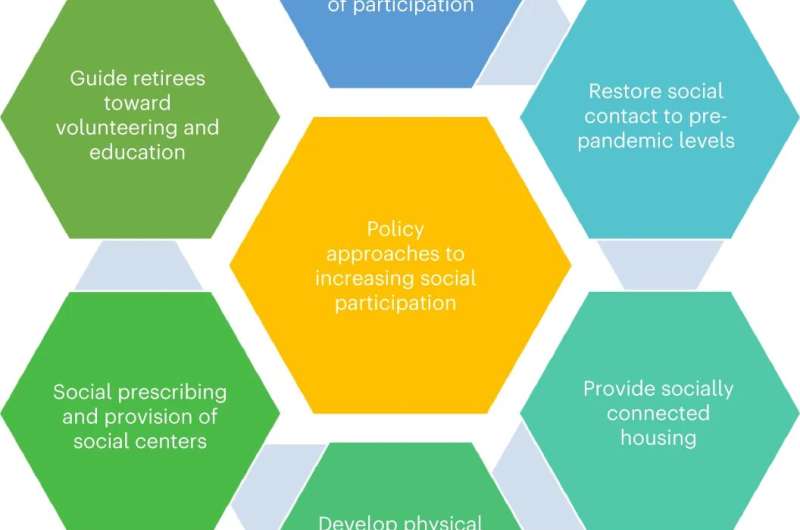This article has been reviewed according to Science X's editorial process and policies. Editors have highlighted the following attributes while ensuring the content's credibility:
fact-checked
peer-reviewed publication
trusted source
proofread
Being socially active in mid-late life linked to 30–50% lower dementia risk

People who are socially engaged when middle aged and beyond are 30-50% less likely to develop dementia later on, finds a new review of evidence led by UCL researchers.
The narrative review, published in Nature Aging, summarizes the observational, interventional and mechanistic evidence for social participation as a way to reduce dementia risk, from studies conducted across the globe, while also providing recommendations for how societies could collectively reduce dementia risk.
The international research team, based in the UK, Finland, US, France, New Zealand and Japan, report that lifelong social participation could alleviate dementia risk by increasing cognitive reserve, and through brain maintenance by reducing stress and improving cerebrovascular health.
Lead author Dr. Andrew Sommerlad (UCL Psychiatry) says, "As the global population ages and the number of people living with dementia rises, estimated at 50 million people worldwide and expected to triple by 2050, there is an increasingly urgent need to find ways to reduce dementia's scale and impact."
"There is a growing body of evidence that being socially active is good for your health and can help keen your brain healthy as you age. Anyone could take this advice on a personal level, but there are also policy and societal changes that could reduce rates of dementia, such as social prescribing, socially connected housing, and more encouragement of volunteering."
The researchers found strong evidence that social participation, and reducing loneliness, can help reduce dementia risk. By pooling the data together, they estimate that people who are more social active in mid to late life are 30-50% less likely to develop dementia later on; while some of this relationship might not be causal, they say there is strong enough evidence that social participation reduces dementia risk that the findings should feed into public health policy.
The study authors suggest the following potential policy implications that could help increase social engagement and hopefully restore social contact to pre-COVID pandemic levels, by reducing financial and logistical barriers to social engagement:
- Provide socially connected housing
- Develop physical environment supporting social participation, as recommended in the WHO's Global Age Friendly Cities Guide
- Social prescribing and provision of social centers
- Guide retirees toward volunteering and education, to help with the transition from working life to retirement without losing social contact
- Improve public awareness about health benefits of social participation
The review findings support evidence from UCL-led research finding that four in 10 cases of dementia could be prevented or delayed by targeting 12 modifiable risk factors from childhood to late life.
More information: Andrew Sommerlad et al, Social participation and risk of developing dementia, Nature Aging (2023). DOI: 10.1038/s43587-023-00387-0





















